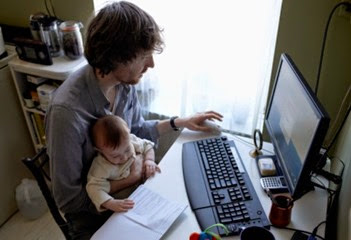 From the Guardian 30/04/14 | Donna Ferguson | "Whatever happened to remote working?":
From the Guardian 30/04/14 | Donna Ferguson | "Whatever happened to remote working?":
Squashed, squeezed and stressed: if you've struggled into work today and are reading this in a crowded office, surrounded by distracting noises, machines, smells and colleagues, and are dreading your commute home, then you are certainly, literally, not alone. Despite the many advances in remote working technology, latest figures from the Office of National Statistics show that 87% of us still work primarily at the office.
Of course, as a commuter, you don't need to be told that – especially if you work in London. Of the 3 million people who commute daily on the London Underground, it is estimated as many as 75% had to battle into the office today, despite the strike action that has ground most of the public transport network to a halt.
A 30 minute stomp from Paddington during the tube strike last week allowed me to get a head-start on my exercise quota for the week some exercise for a change. Despite having to weave my way around the more aimless pedestrians that frequent London's pavements, I've quite enjoyed it.
Why are so many of us continuing to trudge into work? Research by Stanford University has found that remote workers are 13% more productive, take fewer sick days and enjoy a quieter working environment than their commuting colleagues.
But is that 13% more productive when they're actually working, compared to surfing the web, answering the door, clearing up baby vomit or stroking the cat? I wonder.
A survey by Office Angels found a third of employees think commuting will be unheard of by 2036.
Oh, do me a favour! I'm sure another third of those surveyed predicted that they'll have a flying car by 2036.
So what, according to the Guardian, are the possible reasons behind the fact that remote working hasn't caught on?
Lack of trust
"The fear factor for many managers is: 'If I can't see you how do I know you are working?'Promotion paranoia
"Office workers worry that if they're not in the political arena, it might affect their ability to get a promotion. They feel they need to be visible and that their employer may question their commitment if they work from home."Office working isn't all bad
"People want social contact. When you work remotely, there's a risk you'll feel isolated socially. People also worry that the infrastructure they need to work at home – their internet connection or their computer – will let them down.
I'm not really sure that "infrastructure" is the right word there. Besides that, I'd have far more confidence in my own computer and phone than placing any degree of reliance on the incompetent morons that typically work in IT departments.
"Some would miss the camaraderie of their colleagues".
Ah yes - I'm sure homeworkers frequently reminisce about the back-stabbing conniving antics of their former colleagues.
Not all jobs can be done from home
Imagine if you turned up at a hospital or a police station and found everyone had chosen to work from home. Clearly, some jobs require your physical presence – whether it's working on an assembly line, driving a vehicle, guarding a prison, fixing a toilet or saving someone's life.
What's this - 'state the bleedin' obvious hour'?
In legal practice, sometimes clients like to see you in the flesh, as it were. Teleconferencing hasn't really caught on.
The law
At the moment, only parents have the legal right to request flexible working, but from June, every employer will have to consider requests from all employees after 26 weeks' service. Requests can be still be refused on 'business grounds' but reasons will have to be given and could be challenged by an employee.
No comments:
Post a Comment